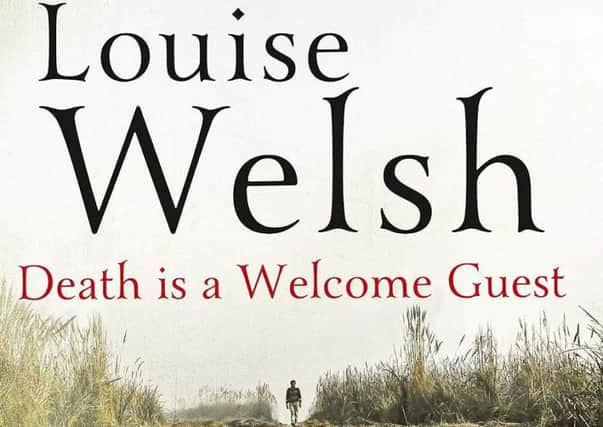Book review: Death is a Welcome Guest


This is the “what if?” of her new novel, the second in her Plague Times trilogy. The world, not just Britain, is hit by a mysterious disease – “The Sweats”. It kills quickly and indiscriminately. Society crumbles, communications fail, panic rules. Some will even think it divine punishment – like the obliteration of Sodom and Gomorrah in Genesis.
Magnus McFaul is an Orcadian, oppressed by memories of the mysterious suicide of his cousin Hugh who walked into the sea. Now in London, Magnus is however making a career for himself as a stand-up comic. Then, returning from a gig at the O2, even as people are dying of the new plague, he is involved in an incident and finds himself in Pentonville Prison unjustly accused of rape. The prison is not immune to the epidemic. Prisoners die in their cells, warders die or flee. Anarchy rules. There is a break-out, despite the efforts of the Army to impose control. Magnus follows his frightening and mysterious cellmate Jeb into a London that has become a wasteland.
Advertisement
Hide AdThis is all done with great brio and an assurance that allows Louise Welsh to skate blithely over the many improbabilities. No matter; it’s like watching a movie rich in extravagant special effects. All the same the novel improves markedly once Magnus and Jeb are free of the prison. There’s a delightful scene with an elderly American academic holed up in a deserted luxury hotel where Magnus and Jeb have kipped.
They set off for the north, Magnus determined to get home to Orkney where he hopes the plague may not have struck and he may find his mother and sister still alive. Jeb accompanies him because Jeb has seemingly no family, nowhere else to go; there is a dark secret in his life waiting to be confessed or revealed. Incidents on the road, one of which causes Jeb to break his leg, lead them to a mansion, the roof “turreted and decorated with urns, like a house in an Agatha Christie novel where someone was due to topple to their death.” Formerly a Catholic seminary, handed to the Church by the now octogenarian Father Wingate, whose family home it has been, it is now the refuge for a small number of survivors. Father Wingate and Jacob, a former Army chaplain with experience of the Bosnian war, hope that they may have the nucleus of a community which can prepare for a new and better life. Magnus would rather move on, but is delayed by Jeb’s broken leg and a sense of loyalty to him. Then Jacob recognises Jeb’s name and remembers why he was in prison. At this point the plot takes a nasty twist, and the reviewer should say no more, beyond remarking that there have already been two mysterious deaths among the small group of survivors.
In Welsh’s dystopia, order breaks down more completely and frighteningly than the historical evidence suggests was the case at the time of the Black Death. This is wholly credible, partly because we are now so dependent on the technology which supplies us with instant information that it’s reasonable to suppose we would be utterly lost if it was to stop functioning, partly because early death now seems an offence against nature as it wasn’t in the Middle Ages, and partly because of the steep decline in religious faith – though Father Wingate is now (presumably) alone in seeing “the Sweats” as an instrument of divine judgement. So Welsh’s depiction of a shattered society with looters, bandit-outlaws and vigilantes is wholly credible, or at least sufficiently so to persuade you to set aside doubts and scepticism as the narrative gallops, often horribly, sometimes frighteningly and certainly disturbingly along. To the question “what if?” she will find readers responding that things might indeed be as she tells us they are.
In the end, of course, you are likely to comfort yourself with the thought that this is only fiction – a scary story told with zest and conviction. Yet you may be left with that nagging doubt. After all there are parts of the world today where Reason seems to be dead, the moral order has collapsed, and given way to anarchy, cruelty, torture, public executions, ethnic cleansing and other horrors. It couldn’t happen here, could it? Louise Welsh shows how it might. She takes us back to the state of Nature imagined by the 17th century philosopher Thomas Hobbes, one in which the life of man was “nasty, brutish, and short”. Yet even when envisaging the worst – a world in which the Sleep of Reason has indeed brought forth monsters, she doesn’t, happily, exclude hope. Love and the willingness to accept responsibility for the well-being of other people, especially children, survive. Magnus is a decent man, and you hope he will come through, even uncorrupted by the horrors he has seen and suffered.
Meanwhile you have read a cracking good story.